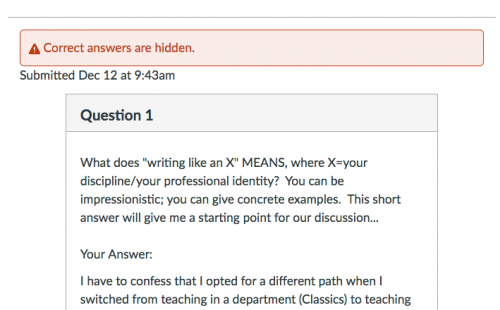I’ll be using this blog in conjunction with the Writing-Enhanced-Curriculum minicourse I’m doing at Canvas; I don’t think the course is public but I will put in a plea for public at some point! I just checked and the link to a content module challenges readers for a log-in. For me, this is great opportunity to connect to other faculty who want to work on writing with their students and also to experience Canvas as an actual course space. I only use Canvas for the Gradebook, but here I will be using Modules and Discussions. Thanks to much to Nick Lolordo for putting this together!
There are learning objectives on the first Module page, and of course my favorite is this: “to allow OU WEC team members to open a dialogue” … I know the WEC team has been doing f2f events on campus, but this is the first online event, so I am excited about that (I live 1000 miles from campus, so I depend on online for access).
Reading through the page on “faculty within a discipline,” I have to confess that I opted for a different path when I switched from teaching in a department (Classics) to teaching General Education courses. Instead of teaching students to think/write like a classicist or folklorist, I’ve gone with storytelling instead. My students are reading stories (I teach Myth-Folklore and Indian Epics), and they are writing stories. Instead of writing within a discipline, I am hoping students will connect more deeply with the content this way: they too are storytellers, and I want them to learn to read like writers.
I can also very much relate to the “separation of writing instruction from instruction” in the modern university. I never expected to become a writing teacher at all, but when I saw how my students were struggling as writers (and my students are mostly graduating seniors!), I redesigned my classes to make them writing-intensive. This admittedly comes as a shock to the students, many of whom come to a “Mythology” class expecting to memorize the labors of Hercules and reproduce that list on an exam. Instead: they are retelling the labors of Hercules in their own way — like this semester, Hogwarts-style.
So, I cannot really connect to discipline.. but I can definitely connect to genre, the subject of the next page. And the fact that it starts with a horror movie is perfect: one of the first writing options in my classes each semester is using Tom Gauld’s horror-filled Holiday Home map as a storytelling prompt. The free-form structure of my class allows students use all kinds of genres, and I encourage students to use genres that relate to their future professions when possible: public relations, advertising, health professions… there are many ways to make story-ful connections like that, and I encourage students to explore all the genres.
And I very much appreciate the truthfulness of this statement: “If your students are writing simply to demonstrate mastery of “the material,” then, speaking from a WEC perspective, you’re not teaching writing! Even if you demand long “research papers” or many pages of writing produced under exam conditions; even if that writing frustrates you with its grammatical errors and stylistic infelicities….you’re not teaching writing. You are using writing; you are teaching; you may be a wonderful teacher! But you’re not teaching writing.”
I agree that the use of writing-as-content-exam is not going to advance students’ writing skills, and in the future they are far more likely to need writing skills than they are likely to need the specific content covered by a specific college class — with only a few exceptions, and Gen. Ed. classes in particular (like the ones I teach) are not likely to be among those exceptions.
After those content pages, there is a brief survey, so now I will go take the survey!
(pause)
I was able to just re-use two paragraphs from my notes to use in answering the survey, and I had to laugh about the mind-numbing LMS. Hacking a quiz to get useful feedback from students is excellent, but poor Canvas is baffled: “Correct answers are hidden” it proclaims, in some kind of oracular proclamation that has nothing to do with what I just typed in the “quiz” box ha ha. So it is, ye seekers after truth: correct answers are hidden indeed. 🙂
Now back to content: mutt genres. This phrase is new to me! It seems to be like what I call “faux genres” or “schooly genres” like the five-paragraph essay and its ilk that we use in the classroom only but which you are not likely to find being used elsewhere. So, in that sense, I am promoting writing within a discipline, but the discipline is not “analyzer of stories” (i.e. classicist) but instead “teller of stories” (i.e. Aesop).
That is the end of the first round of reading and now there is… discussion! Yes! So I will close with a cat here and then go post at the discussion board.
Scribendo disces scribere.
You will learn to write by writing.
(Latin LOLCats)
Crossposted at OU Canvas Community.

